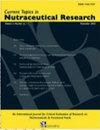Gypenosides Improve Lipid Homeostasis by Regulating Fatty Acid Metabolism in the Liver
IF 0.4
4区 医学
Q4 NUTRITION & DIETETICS
引用次数: 0
Abstract
We have examined the effect of gypenosides on hepatic lipid metabolism in hyperlipidemic mice. To this end, male mice were placed on a high-fat diet and then administered gypenosides. Compared to the mice on the high-fat diet, the levels of liver index, total cholesterol, and low-density lipoprotein cholesterol in the serum were significantly reduced by gypenoside treatment. Gypenosides influenced the overall profile of 22 hepatic fatty acid metabolism genes significantly. Three genes, Cyp4a10, Cyp4a14, and Cyp4a31, had their mRNA expression altered by about tenfold. As a possible mechanism, the findings suggest that gypenosides regulate lipid homeostasis by influencing fatty acid metabolism and promoting fatty acid ω-oxidation.绞股蓝总皂甙通过调节肝脏脂肪酸代谢改善脂质稳态
我们研究了绞股蓝总皂甙对高脂血症小鼠肝脏脂质代谢的影响。为此,雄性小鼠被置于高脂肪饮食中,然后服用绞股蓝素。与高脂饮食的小鼠相比,绞股蓝皂甙治疗显著降低了血清中的肝指数、总胆固醇和低密度脂蛋白胆固醇水平。绞股蓝总皂甙对22个肝脏脂肪酸代谢基因的总体谱有显著影响。Cyp4a10、Cyp4a14和Cyp4a31三个基因的mRNA表达改变了约十倍。作为一种可能的机制,研究结果表明绞股蓝总皂苷通过影响脂肪酸代谢和促进脂肪酸ω-氧化来调节脂质稳态。
本文章由计算机程序翻译,如有差异,请以英文原文为准。
求助全文
约1分钟内获得全文
求助全文
来源期刊
CiteScore
1.10
自引率
0.00%
发文量
36
审稿时长
>12 weeks
期刊介绍:
Current Topics in Nutraceutical Research is an international, interdisciplinary broad-based peer reviewed scientific journal for critical evaluation of research on chemistry, biology and therapeutic applications of nutraceuticals and functional foods. The major goal of this journal is to provide peer reviewed unbiased scientific data to the decision makers in the nutraceutical and food industry to help make informed choices about development of new products.
To this end, the journal will publish two types of review articles. First, a review of preclinical research data coming largely from animal, cell culture and other experimental models. Such data will provide basis for future product development and/or human research initiatives. Second, a critical evaluation of current human experimental data to help market and deliver the product for medically proven use. This journal will also serve as a forum for nutritionists, internists, neurologists, psychiatrists, and all those interested in preventive medicine.
The common denominator of all of the topic to be covered by the journal must include nutraceuticals and/functional food. The following is an example of some specific areas that may be of interest to the journal. i) Role of vitamins, minerals, antioxidants and phytonutrients on cardiovascular health, cancer, diabetes, ocular health, mental health, men’s health, women’s health, infant nutrition, ii) Role of herbals on human health, iii) Dietary supplements and sleep, iv) Components of diet that may have beneficial effect on human health, v) regulation of apoptosis and cell viability, vi) Isolation and characterization of bioactive components from functional foods, vii) Nutritional genomics, and viii) Nutritional proteomics.

 求助内容:
求助内容: 应助结果提醒方式:
应助结果提醒方式:


